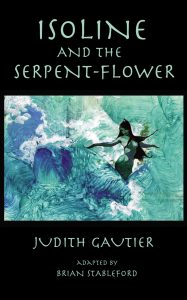Behind the Screen of Silk and Gold: Judith Gautier – GUEST POST by Jean-Marc & Randy Lofficier & Brian Stableford
Behind the Screen of Silk and Gold: Judith Gautier
By Jean-Marc & Randy Lofficier & Brian Stableford
One day, the beautiful Miou-Chen awoke from a long sleep. She was in a wild forest, lying on lotus flowers, a tiger the color of jade asleep at her feet. While she scanned her surroundings, she saw a young boy with shiny brown skin coming through the trees. ‘I have come to you by command of the Lord of Hell,’ he said. ‘The great Jade King admires your wisdom, and if your courage is unfailing, he will consent to let you pass through the gate of the terrible city of Fou-Tou-Tchan and visit his realm.
Most of Judith Gautier’s fantasy work, no matter how exotic it was in form and substance, was overshadowed by two motifs: the painful isolation of the individual, perhaps curable by love, but only with great difficulty or extraordinarily good luck; and the destructive capacity of amorous obsession, ever likely to lead to tragic extremes.
Judith Gautier (1845-1917) was the daughter of the great French Romantic author, Théophile Gautier (1811-1872), and Ernesta Giuseppina Grisi (1816-1895), the sister of the famous ballet dancer, Carlotta Grisi (1819-1899). Gautier had been infatuated with Carlotta, and it seems that it was only because she was careful to keep him at arm’s length, that he consoled himself with her sister, whom he never married, but who bore him two children, Judith (whose actual forenames were Louise Charlotte Ernestine) and Estelle (1848-1914).
Initially farmed out, like most children of her class, to the care of a nurse, Judith was then sent to boarding-school before eventually being accommodated in her father’s household. She grew up in complete freedom. Not only was she not forbidden to read anything, but she could attend the Thursday evenings that her father organized with his artist friends, where she met most of the leading lights of the Parisian literary community. Reportedly, she even helped him when he wrote Le Roman de la Momie [The Romance of a Mummy] (1858).
 Reflecting on the peculiarity of her upbringing, she later remarked, sarcastically, that her father had only ever given her two pieces of advice, both of which she had ignored to her cost: always wear a corset, and don’t marry Catulle Mendès (1841-1909). In fact, her marriage to the flamboyant but unreliable young writer when she was only 21 was not only unhappy, but caused the break-up of her parents’ relationship, when her mother recklessly took her daughter’s side.
Reflecting on the peculiarity of her upbringing, she later remarked, sarcastically, that her father had only ever given her two pieces of advice, both of which she had ignored to her cost: always wear a corset, and don’t marry Catulle Mendès (1841-1909). In fact, her marriage to the flamboyant but unreliable young writer when she was only 21 was not only unhappy, but caused the break-up of her parents’ relationship, when her mother recklessly took her daughter’s side.
Judith eventually separated from Mendès eight years later (in 1874), but did not divorce him until 1896. She apparently had no desire ever to marry again, but was rumored to have had a long series of affairs, including with her father’s friend, Victor Hugo (1802-1885), and German composer Richard Wagner(1813-1883), whose music had made a deep impression on her, and about whom she wrote two significant memoirs.
Everyone who met her praised her beauty, which sometimes annoyed her. John Singer Sargent, under her charm, painted her portrait. Suzanne Meyer-Zundel, her confidante and friend (and possibly her lover), wrote that “Judith would have liked to conquer men by her brain alone and despised the untimely role that physical attractiveness always played with her male admirers. […] Gounod was one of those who did not misunderstand her true state of soul: ‘Madame,’ he said to her one day, ‘what you miss is tha you are alone in your brain… alone of your kind.’”
Perhaps oddly, the man who ultimately had the greatest influence on her literary work was Tin Tun Ling, a political refugee from China to whom her father had kindly offered temporary refuge, and who taught her to read and speak Chinese. It was probably the sheer eccentricity and exoticism of that prospect that attracted her initially, but her interest in Chinese culture and legendry, and its reflection in her work, did provide her with a ready means of distinguishing her productions from those of everyone to whom she might otherwise have been compared to her detriment.
It did not make her entirely unique—Pierre Loti (1850-1923) subsequently made a literary career out of studied Orientialism that inevitably led to comparisons, and to one a play written in collaboration with Judith, La fille du ciel (1912; English, The Daughter of Heaven), translated and produced under their personal supervision at the Century Theatre in New York. But it did at least allow her to preserve the distinction that had, so to speak, been her birthright.
Judith had already published a number of articles before her marriage. The first, published when she was 18, was a review of Charles Baudelaire’s translation of Edgar Allan Poe’s story Eureka, and is said to have delighted the poet— who was not easily pleased.
Her first book, Le Livre de jade [The Book of Jade] (1867), was a collection of poems translated from Chinese. It was followed by a historical novel set in the Orient, Le Dragon impérial (1869 as by Judith Mendès; tr. as The Imperial Dragon), but it was not until after her separation from Mendès that she began publishing books on a regular basis. Her next novel, L’Usurpateur [The Usurper] (1876; reprinted as La Soeur du soleil [The Sister of the Sun]) also appeared initially with the signature Judith Mendès, but she reverted to the surname Gautier thereafter, for the novel Lucienne (1877) and her first short story collection, Les Cruautés de l’amour [The Cruelties of Love] (1879).
Judith Gautier experimented with various settings before settling into fantasy, but even works that she set in contemporary Europe retained a calculated exoticism, which reacted, to some extent, to the peculiarities of her own life as well as to the literary models laid down by her father. (Whether she ever wanted to follow in Théophile Gautier’s literary footsteps or not, the substance of such endeavors were bound to cast a shadow over whatever she wrote or did.)
While she was in love with Mendès, Judith presumably had some commitment to the ideas of the Parnassian Movement, but when she fell out of love with him, she presumably felt little pressure to follow him into the more cynical extremes of the Decadent Movement. Her fantasy work remained solidly anchored within the precepts of Romanticism, while consciously ironic, always inclined toward the bizarre.
 Isoline et la Fleur-Serpent (1882) [Isoline and the Serpent-Flower], translated by Brian Stableford (2013), was her first and major collection of fantasy tales. The eponymous story features an extraordinary heroine and recycles the plot formula of the Sleeping Beauty with a sharp ironic edge. “La Fleur-Serpent” [The Serpent-Flower] develops the Poesque themes of obsession, guilt and vengeance from beyond the grave. “Trop tard” [Too Late] is as close as she ever came to penning a subversive pastiche of her father’s tales of hallucinatory erotic obsession.
Isoline et la Fleur-Serpent (1882) [Isoline and the Serpent-Flower], translated by Brian Stableford (2013), was her first and major collection of fantasy tales. The eponymous story features an extraordinary heroine and recycles the plot formula of the Sleeping Beauty with a sharp ironic edge. “La Fleur-Serpent” [The Serpent-Flower] develops the Poesque themes of obsession, guilt and vengeance from beyond the grave. “Trop tard” [Too Late] is as close as she ever came to penning a subversive pastiche of her father’s tales of hallucinatory erotic obsession.
But she evidently found the ready-made exoticism of the Orient a more convenient costume for the deliberate artificiality of her accounts of the peculiarities of human relationships. Some of her stories are, or at least represent themselves as, straightforward renditions of pre-existent myths and legends, but her narrative method and style remained her own, and her best works in that vein are those in which she imposes her own mark upon her material, such as in the flamboyantly melodramatic “Le Prince à la tête sanglante” [The Prince with the Bloody Head]. She always felt that melodrama and the supernatural were far more appropriate to such distant settings than to contemporary European milieux.
Judith Gautier published three other collections entirely composed of such works, Fleurs d’Orient [Flowers from the Orient] (1893), Le Paravent de soie et d’or [The Screen of Silk and Gold] (1904), and the posthumous Les Parfums de la pagode [The Scents of the Pagoda] (1919).
Judith Gauthier finally undertook to tell her story in Le Collier des jours [The Chain of Days] (1902), the third and last volume of which remained unfinished.
Judith Gautier’s fantasy works never won her a wide audience, but they did command a considerable degree of critical respect. Her undeniable talent earned her the honor of being the very first woman to be admitted to the prestigious Académie Goncourt in 1910. (Ironically, she took the seat of the late Jules Renard, who heartily hated her works.)
She represented a considerable refinement of the primitive Orientalism pioneered by early members of the French Romantic Movement. Her versions of China and Japan bear little resemblance to the actual countries. They are a mythical, idealized Orient that never was, more akin to the far-away lands described by Lord Dunsany or Jack Vance, but she made a significant contribution to the development of a literary Orient that was subsequently to be exploited by numerous later writers, of whom the best known exponents in the English language are “Frank Owen” (Roswell Williams) and “Ernest Bramah” (Ernest Smith).
Théophile Gautier had said of his daughter: “Judith has much more talent than Madame [George] Sand and yet, as you will see, she will never be successful.” One might think that he was unfairly denigrating his daughter, but that wasn’t the case. He had always encouraged and supported her literary ambitions, even when their relationship had become more tense after her marriage to Mendès. Rather, it was a reflection on the fact that the admiration aroused by Théophile and then Judith did not pay the bills and both father and daughter had to sweat blood to live from their pen.
Judith Gautier was an independent woman, sometimes detached from the real world, preferring to live in her imagination. She did mark the spirits of her time, yet without being able to anchor her name in their collective memories. A little over century after her death, it is clear that her father had been correct in his assessment. Judith Gautier was uniquely talented; yet, she left little posterity in French literature.
BOOKS:
Judith Gautier: Isoline and the Serpent-Flower, Black Coat Press, ISBN 978-1-61227-152-1.
Bettina L. Knapp. Judith Gautier: Writer, Orientalist, Musicologist, Feminist. Hamilton Books.
Black Coat Press was born in 2003 as a logical development in our desire to bring out the best of French popular culture into the English language. First, there was our massive French Science Fiction, Fantasy, Horror & Pulp Fiction encyclopedia published my McFarland in 2000; then there was our coolfrenchcomics website, and finally our two non-fiction Shadowmen books which, with our translation of Doctor Omega, were the first books published by Black Coat Press.
We had been working for Starlog and in comics for years prior to our desire to become publishers. We had, in fact, been translating a number of award-winning French comics for Marvel (the Moebius series) and Dark Horse (works by Tardi, Andreas, Druillet, Schuiten and others). So moving into books was a natural extension. We had already co-authored over a dozen books about movies and television series, such as The Doctor Who Programme Guide, Into The Twilight Zone, Science Fiction Filmmaking In The 1980s and The Dreamweavers, the latter two from McFarland.
It had always been a source of profound frustration to us that, because of the language barrier, the knowledge of many outstanding French works was denied to the American public. There was a time when French novels and French films were widely imported in the United States. People were mobbing the New York harbor waiting for the latest installment of Alexandre Dumas’ novels. Yet in the age of the global village, this cross-cultural exchange has shrunk to next to nothing, and I think America is the poorer for it. The purpose of Black Coat Press was to help remedy this sad state of affairs by providing a fairly comprehensive selection of the best and/or the most representative works, with proper introductions, bibliographies, etc. Because science fiction, fantasy, etc. are often regarded as minor genres by “serious” scholars (on both sides of the Atlantic!), we felt that publishing works of this nature would be more useful than publishing classic or mainstream novels, for which there are at least a few outlets available.

